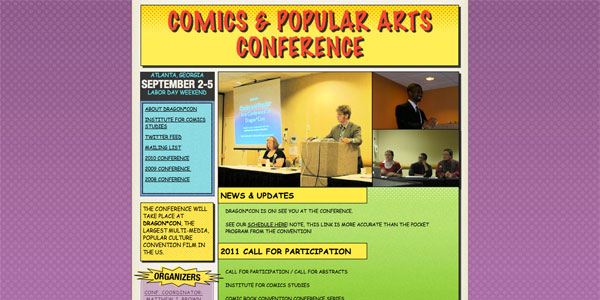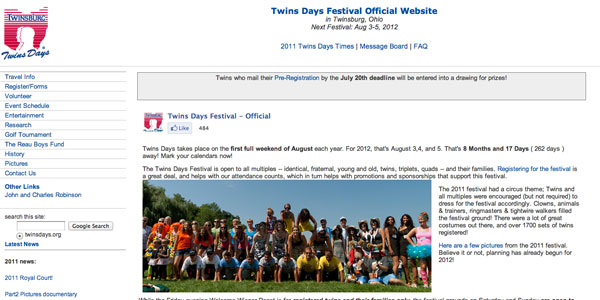If you’ve been paying attention to news about academic conferences lately, you’ve probably noticed a pretty shocking story: the University of Chicago recently hosted a Jersey Shore conference. Yes, really. We’ve entered an era in which we study the impact of a reality show that glamorizes a rigorous regimen of gym, tan, and laundry. But more on that later. While a Jersey Shore academic conference is certainly unusual, the fact is that it’s not the first of its kind. Strange and obscure, even disturbing academic conferences have existed for some time. Read on, and we’ll take a look at 20 academic conferences you may not even believe exist.

-
Jersey Shore Studies
So yes, there really was a conference all about Jersey Shore at the University of Chicago just a few weeks ago in October 2011. And although news media (ourselves included) are quick to point out the ridiculousness of its existence, the fact is that the wildly entertaining show provides a variety of rich cultural studies. In this conference, presenters and attendees discussed the financial impact of the show on Jersey Shore communities, archetypes and stereotypes found in popular culture and reality TV, and in one presentation, even successfully argued that Foucault and Snooki might have something in common. Still, talk show host Jimmy Kimmel made an adept observation on the conference’s strange existence: “The University of Chicago is hosting an academic conference called “Jersey Shore Studies”. Meanwhile in Korea, students are learning something called “math.”
-
LeakyCon
Unless you’re a Harry Potter fan, you probably have no idea what LeakyCon even is, given that the name could possibly be used for a plumbing convention. The convention, which derives its name from The Leaky Cauldron, a web community for Harry Potter fans, discusses, you guessed it, the world of Harry Potter. And although it’s yet another pop culture convention, LeakyCon does have academic significance, with an academic staff including one self-professed nerd that wrote a masters dissertation on the Harry Potter series. The convention brings together some of the best academic minds in the Harry Potter canon with incredibly dedicated fans, offering a celebration of all things Potter, along with plenty of thoughtful discussion on the larger issues at hand within the book series and it’s worldwide impact.
-
Social Media A Capella Conference
Social media is hot right now, and so is a capella signing, as evidenced by the popularity of shows like Glee and The Sing-Off. Why not bring the two together? At the Social Media A Capella Conference (SMACC), students, professionals, and academics enjoyed the opportunity to participate in workshops that highlighted both social media and a capella performance. The event also included a student singing competition and professional showcase. Perhaps most importantly, students learned how to make Twitter and other social media resources work to further their careers in a capella music. As one attendee shared, “It was exciting to know that there was room full of people learning to beatbox right next to a room where a seminar about integrating social media into your life was happening.”
-
Slayage
Outsiders might view Buffy the Vampire Slayer as just a TV show, but to some academics, it and other Joss Whedon creations represent so much more. According to papers discussed at the conference, Buffy offers an opportunity to learn about feminism, identity, gender stereotypes, and even a comparison between Buffy and Greek myths. Of course, Buffy the Vampire Slayer as an academic study is not new: “Buffy studies,” also known as “Buffyology” has been around since at least January 2001, with the first publication of Slayage: The Online Journal of Buffy Studies. Plenty of papers, books, and even courses have followed, so it’s not entirely surprising that the Slayage conference exists.
-
Dragon*Con
Continuing on our pop culture theme, we’ll point out that although Dragon*Con is primarily a fantasy and science fiction conference, it also lends itself to academic study. Along with the Institute for Comic Studies, Dragon*Con puts on a mini academic conference, and has done so for the last four years. The conference takes a scholarly look at comic books, sci fi, and pop culture, including literary criticism, history, and philosophy. Nearly anything relevant to the study of comics and popular arts is welcomed, and the conference furthers the study of comics in a seriously fun way.

Baseball and the ‘Sultan of Swat’
At Hofstra University, a three day conference celebrated Babe Ruth and not just his presence in baseball, but in art, literature, politics, psychology, law, legend, and more. Nearly every genre of academia got a chance to speak out about Ruth and his impact, including a mathematics professor who spoke on The Mathematical Comparisons Between Babe Ruth and Other Sluggers and a medical ethicist who discussed Professional Ethics of Behavior Off the Field: Why Babe Ruth Should Be in the Hall of Fame and Pete Rose Should Not.
B4U-ACT
It’s a widely accepted fact that pedophilia is wrong, and although individuals might engage in acts of pedophilia in moments of weakness, there’s little room to argue that it’s anything but a crime against nature and children. However, B4U-ACT believes otherwise, and in August 2011, sponsored a conference that worked to normalize pedophilia. It sounds like a fringe event that might have been attended by just a handful of sketchy subjects, but the reality is quite far from that idea: panelists from the Harvard, Johns Hopkins, and other prominent universities were involved in the conference. The conference’s ultimate goal was to change the Diagnostic and Statistical of Medical Disorders (DSM) which the American Psychological Association uses to define pedophilia and its treatment. This is not the first time pedophilia has made an appearance at an academic conference: one attendee recalls meeting up with people she called “The Academic Pedophile Lobby” in 1977 at The British Psychological Society Conference on Love and Attraction.
Starship Symposium
A Starship Symposium just sounds crazy, like an invitation to show up with your tinfoil hat to talk about travel to other galaxies and alien encounters. And while we genuinely believe some attendees did take advantage of the opportunity to discuss weird ideas about space, the symposium is refreshingly serious in nature. The DARPA symposium works to support and further the disciplines needed to make long-distance space travel work, and takes a look at long term technology development that will ultimately result in an effort to send a spaceship to a star. The symposium was amazingly popular, with one session moderator and University of Washington physics professor remarking, “In times to come I predict this will be looked back on as the Woodstock of star travel.”
Breaking Convention
A psychedelic convention is something you’d expect to have been left behind from the 60s, but this psychiatric symposium in the UK keeps it alive and well. The Breaking Convention symposium works to share the contemporary studies that are exploring the role of hallucinogens in modern medicine, through speakers, debates, and more. Breaking Convention also shares the future of psychedelic culture and research, highlighting university courses and other scientific pursuits in psychedelic studies.
Penny Arcade Expo
Like Danger*Con, the Penny Arcade is an expo that highlights a segment of pop culture, but also offers academic studies for those interested. In this case, Penny Arcade is all about gaming, a subject that is certainly relevant in academia today. In one panel at the Penny Arcade, academics from MIT, USC, and other respected universities presented their progress in game studies and research in academia, while, we’re assuming, gamers looked on in awe and resolved to create academic studies for gaming in their own colleges and universities.

American Bodies
Maybe we just don’t understand it, but the American Bodies conference at the Graduate School of North American Studies in Germany doesn’t make a whole lot of sense to us. This interdisciplinary conference takes a look at pretty much every way America has gained power, through political, economic, religious, and social bodies. And although those seem to work together to discuss America, the conference loses us when it makes the stretch to include bodies of water, of work, and bodies of race, gender, and even beauty.
International Conference on Prostitution
Sex conferences are far from obscure, with porn conventions, sex industry trade shows, sex toy conventions, and more. At least on the surface, they seem to be more about debauchery and money than academic pursuit. But one sex conference was actually organized by a university, Cal State Northridge’s Center for Sex Research. In this conference, scholars studied prostitution, aided by professionals in the industry including Xaviera Hollander, author of “The Happy Hooker,” as well as Heidi Fleiss. Panels took a serious look at the prostitution industry, including talks on The Law and Sexual Tourism as well as The Client and Being a John. The prostitution conference wasn’t the first controversial academic conference put on by the Center for Sex Research, either, with past topics including sexual predators and transgender behavior.
1968
If there was any one year that you’d choose to study, what would it be? 1776? 1865? 2001? For this event’s organizers, 1968 is the one. To those who are not well versed in history, it certainly seems like an arbitrary date, but upon examination, this conference offers quite a bit of academic relevance, reflecting on the year that saw 17,000 soldiers killed in Vietnam, and the assassination of both Martin Luther King, Jr. and Robert Kennedy. But the conference doesn’t just focus on historic American events that occurred in 1968, it branches out to include a mini-conference on the 1968 experience in Latin and Spanish America, as well as a mini-conference on music and a 1968 film series.
Dimensions of Goodness
Lovers of “everything good and holy” will certainly be excited to hear about this event at Notre Dame. Speakers at the conference will discuss subjects related to “the good” from a wide variety of disciplines, including theology, biomedicine, political science, and psychology. If you’re interested in exploring the world as it is, and as it should be, this is a conference worth checking out.
Twins Days Festival
If you happen to stumble upon the Twins Days Festival in Twinsburg, Ohio, it’s probably a little unnerving to see so many twins at once: apparently they’ve been flirting with the milestone of 3,000 sets for some time. But if you’re an academic researcher studying twins, the festival is a godsend. Researchers attend the convention to draw from the large available pool of twins at the festival, offering small compensation for participating in academic projects.

Comics Arts Conference
Like the Penny Arcade Expo, the Comics Arts Conference is one that focuses on a segment of pop culture that most people regard as pure fun, while others take an academic look at it. This conference is held in conjunction with Comic-Con International and WonderCon, taking a serious look at comics as a medium. It includes seminars, sessions, and discussion on a variety of scholarly topics in the study of comic books and comic arts, including presentations from industry icons Will Eisner and Scott McCloud.
Catholic Conference on Geocentrism
Is Earth the center of the universe? The world says no, but this conference says yes. At this conference on geocentrism, members of the Catholic community argue that “Galileo was wrong” and the church was right, supporting the academic belief that the Earth is immobile in the center of the universe. The conference shares scientific information from physics, astrophysics, astronomy, and more, with new scientific evidence available that now shows the idea of an immobile Earth is “not only scientifically supportable, but it is the most stable model of the universe and the one which best answers all the evidence we see in the cosmos.” Sessions include studies of what really happened between Galileo and the church, answers to common objections to geocentrism, and scientific evidence that show the Earth in the center of the universe.
Midwestern Women Artists
This conference seems innocuous enough, but it’s just so obscure we can’t let it go. The Midwestern Women Artists symposium explores the stories of female artists from 1840-1940. While other conferences on this list are exploring starships and psychedelics, this one takes a look at Middle American art. We certainly don’t begrudge the value of female artists from the Midwest, but this conference just seems too finite to exist.
Honour Killing Across Culture and Time
Like the Midwestern Women Artists conference, we’re sure that the honor killing conference has its place in the canon of importance, but it’s just so darn specific it’s hard to believe it exists at all. Still, the description paints a picture of a rich conference exploring honor-motivated violence, a phenomenon that transpires history and cultures. Check out the conference’s resources to learn about honor in gendered violence, the concepts of gender and shame, and anti-violence strategies.
The Amaz!ng Meeting
This conference is downright amazing. Don’t believe it? Neither do most of the attendees. This conference is a “celebration of critical thinking and skepticism,” promoting the study of paranormal and supernatural claims, science advocacy, and more. Panels include Problems in Paranormal Investigation, Placebo Medicine: The Ethics and Mechanisms of the Mysterious Placebo, and Attack of the Theocrats — and What We Can Do About It, as well as speaking engagements from Bill Nye, Richard Dawkins, and Neil deGrasse Tyson.
No comments:
Post a Comment